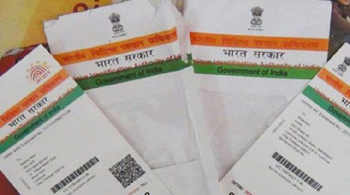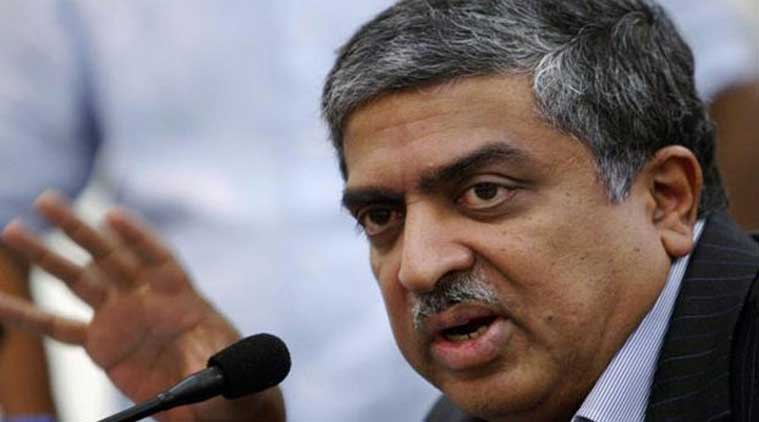Aadhaar bill is through after Opposition score objection
Mangalore Today News Network
Mar 17, 2016: Hours after the Opposition, making most of the NDA’s lack of numbers in Rajya Sabha, pushed through five amendments and returned the Aadhaar Bill to Lok Sabha, the Lower House rejected the changes suggested and passed the Bill through a voice vote in its original form Wednesday. The Aadhaar (Targeted Delivery of Financial and Other Subsidies, Benefits and Services) Bill, 2016, brought in by the government as a money Bill, was opposed by the Opposition over concerns that access to the biometric database in the interest of national security would compromise privacy.
The Aadhaar (Targeted Delivery of Financial and Other Subsidies, Benefits and Services) Bill, 2016, brought in by the government as a money Bill, was opposed by the Opposition over concerns that access to the biometric database in the interest of national security would compromise privacy.
Since it was a money Bill, it could not be rejected or amended by Rajya Sabha. The Upper House can only make recommendations for amendments but those have to be agreed to by Lok Sabha to become effective. The Lok Sabha can decide not to agree to any of the recommendations — and this is precisely what happened Wednesday. The Rajya Sabha has to return a money Bill within 14 days after receiving it from Lok Sabha, failing which the Bill is considered passed by the Upper House.
Participating in the debate in Rajya Sabha, Congress MP Jairam Ramesh, the author of all amendments passed by the Upper House, conceded he was probably indulging in a futile exercise but said it was his, and his party’s duty to suggest changes that he considered necessary to improve the Bill.
“We all know what the end result of this debate will be,” Ramesh said, describing the labelling of the Aadhar Bill as a money Bill an attempt to “knock a nail in the coffin of the Upper House”.
Ramesh had proposed nine amendments in the Bill, but insisted on a vote only on five, each of which was approved. Two of these received 76 votes in support and 64 against, two more got 77 votes in support and 64 against, while one amendment received 76 votes in support and 65 against. Four other amendments, on which Ramesh did not insist on voting, got rejected by voice vote.
The amendments by Ramesh suggested a provision to allow a person to “opt out” of the Aadhaar system, even if already enrolled, and another to ensure that if a person chooses not to be part of the Aadhaar system, he/she would be provided “alternate and viable” means of identification for purposes of delivery of government subsidy, benefit or service.
Another amendment sought to restrict the use of Aadhaar numbers only for targeting of government benefits or service and not for any other purpose.
Ramesh said the government Bill seemed to make Aadhaar numbers mandatory for everyone desirous of claiming government benefits, but the Supreme Court had already ruled against this.
Another of the amendments sought to change the term “national security” to “public emergency or in the interest of public safety” in the provision specifying situations in which disclosure of identity information of an individual to certain law enforcement agencies can be allowed. Ramesh argued that “national security” was a “loose” term liable to be misused in interpretation by the government of the day.
Many other speakers from the Opposition benches criticised the government for labelling the Bill as a money Bill, and said it did not qualify as such. They also cautioned the government against making Aadhaar numbers mandatory for claiming government benefits and services.
Finance Minister Arun Jaitley, while clarifying the points raised by members, said it had been judicially settled in many countries, including the United States, that if an individual wants to claim specific government benefits, asking him or her to enrol for a Aadhaar like programme is not unjust. “You cannot stake a claim to the benefits and at the same time be unwilling to shed privacy concerns,” he said.
But this argument was rejected by the Opposition benches. Sitaram Yechury of CPM, Tapan Sen and D Raja of CPI, and Naresh Agarwal of Samajwadi Party were among those who said they were not satisfied with the clarification.
Independent member Rajeev Chandrasekhar raised the concern that an Aadhaar number could be obtained by non-citizens as well and wanted the government to take steps to prevent such a possibility.
Earlier, the Rajya Sabha witnessed heated exchanges when Jaitley got up to introduce the Aadhaar Bill. Opposition members from the Congress, Left parties, BSP and Samajwadi Party accused the government of attempting to bypass Rajya Sabha. Jaitley spoke for about half an hour explaining why the Bill qualified as a money Bill.
NDA’s Aadhaar Bill stronger than UPA’s on privacy: Nilekani
Nandan Nilekani , the first Chairman of the Unique Identification Authority of India (UIDAI), and considered one of the chief architects of Aadhaar, says the NDA government’s Aadhaar Bill has enough safeguards and this is probably the most stringent law on privacy till date in India.

“In fact, this (the Bill on privacy) is stronger than the original Bill. The Bill has very robust privacy protection beyond what any other legislation has ever provided in India. It is as good as it gets,” Nilekani told The Indian Express.
The Aadhaar (Targeted Delivery of Financial and Other Subsidies, Benefits and Services) Bill, 2016 clearly specifies that the biometric information captured will be used only for Aadhaar enrolment and authentication. It will not be used for any other purpose nor shared with anyone. Such information will not be published or displayed publicly. Further, the authority cannot reveal the biometric information to any institution requesting authentication for a specific purpose.
The only exception to privacy protection that the Aadhaar Bill, 2016 provides is for reasons of national security. An individual’s information may be revealed in the interest of national security if a joint secretary in the Central government issues such a direction. Here, too, the decision will be valid for six months, and has to be reviewed by an Oversight Committee comprising the Cabinet Secretary and the secretaries of Legal Affairs and Information Technology.
While this has sparked a debate on privacy being compromised in the name of the vaguely defined national security, the UPA government’s National Identification Authority of India Bill of 2010 too provided for such an exception in the interest of national security. The only difference is that the joint secretary had to take the approval of the Minister-in-charge. In the Aadhaar Bill, 2016, it is the highest level bureaucrat (Cabinet Secretary-led oversight committee) and not a political committee.
According to Nilekani, “World over every database is open for national security. In any country, national security concerns provides for authorities to access any system. The question is whether anyone will misuse it. The Aadhaar Bill has enough safeguards, and its privacy constraints are stronger than the previous Bill. It is a big leap forward in the quality of legislation India has seen.”
Arghya Sengupta, Research Director, Vidhi Centre for Legal Policy, who assisted the NDA government in drafting the Aadhaar Bill, said personal privacy and personal data protection are two distinct issues. “My personal privacy is different from data protection. Of course, we need a separate privacy law. That is a big gap in the system. But as far as privacy of personal data and its protection is concerned, the Aadhaar Bill is a beta version of the privacy law will look like,” he said.
Explaining the rationale behind a bureaucrat-led oversight committee instead of a political committee (the earlier Bill provided for clearance by a minister-in-charge) to review a direction by a joint secretary, Sengupta said, “National security is not a prerogative of Parliament, but of the government.” While the possibility of misuse will always exist, the ultimate guard is the courts, he added.
- MRPL appoints three new Executive Directors to strengthen leadership team
- Puttur: Two arrested in prostitution racket bust at Samethadka
- Press Day: ’Trust in print media remains strong’, says Walter Nandalike
- Mangaluru: Car catches fire after hitting electric pole to avoid dog
- Changes in train services to facilitate track maintenance works in Palakkad division
- ’Will be Karnataka CM for five years’ says Siddaramaiah amid buzz of leadership change
- LKG, UKG classes launched in DK and Udupi Anganwadis; English training begin
- Karkala’s Ayush Shetty wins U.S. Open badminton title
- Missing lovers from Kumble traced in Udupi
- Bantwal: Absconding murder attempt accused arrested after 8 years
- Mulki Abdul Latif murder case: Accused arrested after three years
- No link between Covid vaccine and sudden deaths, health ministry clarifies
- Didn’t discuss leadership change with MLAs, MPs in Karnataka: Congress leader Surjewala
- Infosys techie in Bengaluru arrested for secretly filming Woman In Toilet
- After tigers, over 20 monkeys found dead in Chamarajanagar district; poisoning suspected
- Bangladesh’s deposed PM Hasina sentenced to six months in prison by ICT
- Bengaluru Stampede: Govt moves HC against CAT order revoking IPS officer’s suspension
- Trump proposes time limit on student visas in move to remove immigrants
- No paucity of funds in Karnataka for development, assures Surjewala
- Dalai Lama says his Trust will lead search for his successor
- Telangana pharma plant explosion: Death toll rises to 36
- "Will not accept intimidation": Zohran Mamdani to Donald Trump over arrest threat
- Indian Navy contains fire on board Palau-flagged tanker with 14 Indian crew
- Delhi begins ban on fuel sale to old vehicles; AI cameras, traffic police teams deployed at pumps
- Surjewala continues meetings with Congress MLAs in Karnataka
- Daiva’s prediction comes true: Janardhan Reddy walks free from jail
- Skills and Competencies Take Center Stage at MSN Dialogue Series
- Court remands Maoist Lakshmi to six-day police custody
- Sandhya Shenoy honored with Society for Materials Chemistry Medal-2024
- White Cornus Apartment in Mangaluru
- City girl wins first place in state-level spell bee competition
- Alleged ‘Love Jihad’ Case in Mangaluru: Woman left home voluntarily, says police
- Girl fatally struck by reckless two-wheeler near Belman
- New residential complex for the judges inaugurated in Mangaluru
- Absconding accused nabbed after 8 years
- Truck with cylinders turns turtle in Beltangady
- Bhoota Kola artist dies of cardiac arrest
- Development of the country should be our goal: Ganesh Karnik
- Container truck gets stuck under Modankap railway bridge
- Truck crushes bike’s pillion rider near BC Road
- CITY INFORMATION
- TRAVEL
- TOURIST INFORMATION
- HEALTH CARE
- MISCELLANEOUS




 Write Comment
Write Comment E-Mail To a Friend
E-Mail To a Friend Facebook
Facebook Twitter
Twitter  Print
Print 

